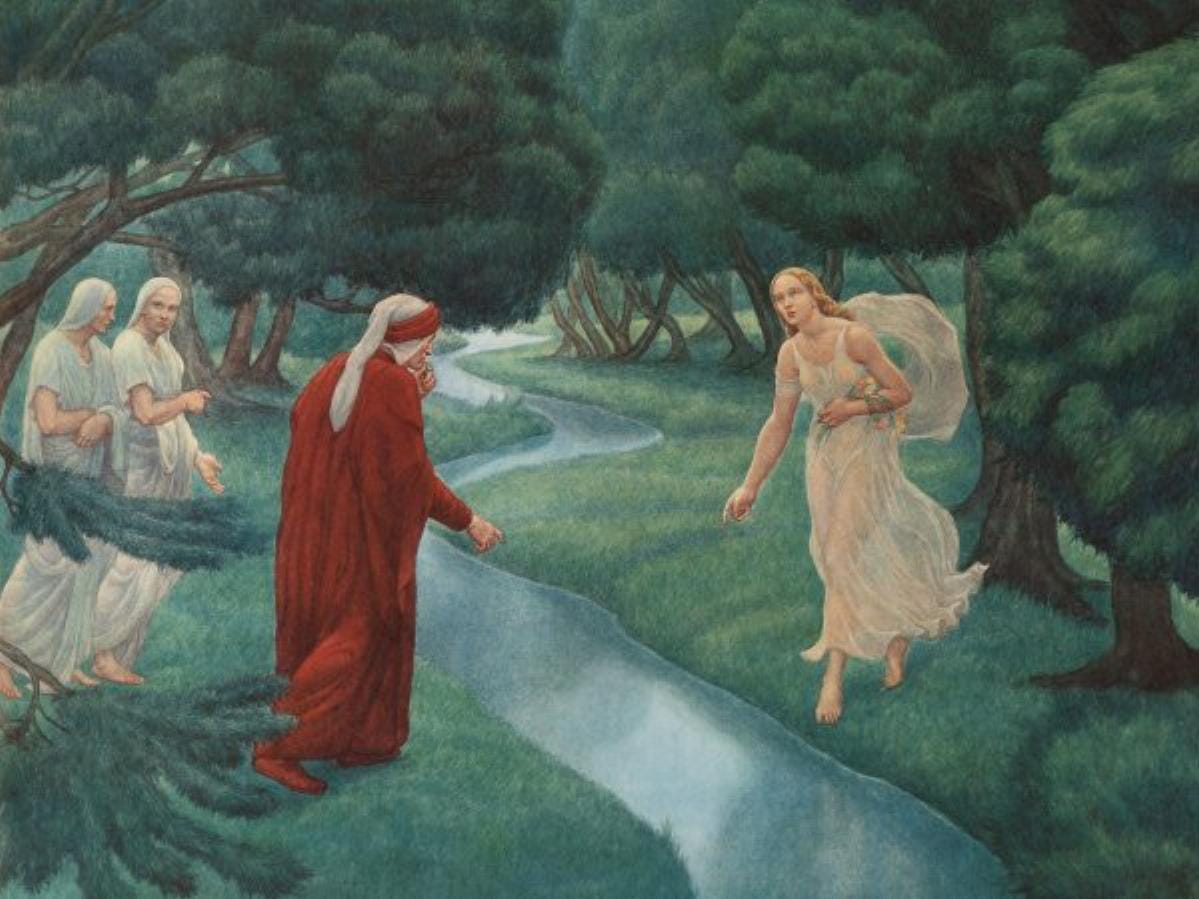We made it! After more than a year and a half of journeying together through the afterlife, we enter Earthly Paradise.
Canto 28 is all about pleasure and desire. Virgil’s last words to Dante, at the end of canto 27, encouraged him to trust his sense of pleasure and desire, and as he steps onto the top of Mount Purgatory, that is exactly what he does.
The first part of the canto is fully descriptive as if to follow the pilgrim’s complete self-abandon to his new surroundings. Immediately, we note the juxtaposition between the “holy forest” of Earthly Paradise and the “dark wood” of Inferno, canto 1. A nice reminder of how far we’ve come.
Dante is mesmerized - the garden is encrusted in beautiful flowers that grow of their own accord, a pleasant breeze makes the atmospheric conditions just right and birdsong rises from the treetops. The only things capable of pulling him out of this daydream are a brook and the sight of a beautiful woman. Or rather, the river is separating him from her.
Without telling us her name, which we will discover in canto 31 is Matelda, Dante describes her graceful and confident dance around the river bank, as she gathers multicolored blooms and sings to herself. Desperate to hear her song he bids her closer and she obliges.
There are two things that stand out here. Dante’s description of the first woman he meets in the realm of God borrows pagan imagery, more specifically the figure of Proserpina (the Roman name for Persephone). This is interesting to me because it shows just how much of a syncretist Dante was, that even on the doorstep of heaven he still makes references to classical antiquity.
The second thing I love about Matelda’s depiction here is the description of her walk, “scarcely setting foot in front of foot”, which suggests that there’s a floating quality to her presence and which we haven’t seen in any of the souls of hell and purgatory.
When she finally gets close enough to the river, Dante says she gives him the greatest gift: she raises her eyes.
I don’t mean to police anyone’s tone here, but the simile between Matelda’s eyes and Venus’s loving gaze reads very sensual to me (It seems like Dante really took “pleasure and desire” very seriously) - especially if we consider the subsequent description of Dante’s dismay at the fact that they are still across the river from one another.
Luckily, Matelda is slightly more composed and we actually get a bit of dialogue here - well, as expected Dante doesn’t say much, so more of a monologue.
She confirms that we are, indeed, in the Earthly Paradise, the place in which “through his own fault, Man did not dwell long”. She also gives us some details about the geography of the place, explaining that it raises far above any mountain that exists on Earth. For this reason, the garden is not subject to the laws of the physical world, but rather it exists in relation to the perfect movement of the heavenly spheres which God has set in motion (Dante will see the spheres in Paradise, so it’s ok if that doesn’t make much sense to you right now).
In a similar vein, the plants come from God whose force makes it possible for them to flower and bear fruit without needing a seed to grow from. The river that separates them is also from God. But this isn’t the only interesting thing about this river - its waters make anyone who passes through them forget their sinful past.
Dante lifted this idea from classical literature as well as the river’s name: Lethe. However, he adds a Christian layer to it. In the pagan Underworld, Lethe simply made the dead forget but Dante’s version of it splits into two. On one side of the Earthly Paradise, the river it’s called Lethe, and it makes you forget about your sins, but on the other, it’s called Eunoe and it makes you remember the times when you were virtuous.
Another fun note is that the word Eunoe is Dante’s own invention, from the Greek eu- meaning good or well and noesis, meaning knowledge.
Speaking of knowledge, the canto ends on a “footnote” to use Matelda’s term. Having answered Dante’s question, Matelda volunteers that this is the place that some of those ancient poets dreamt of as Parnassus and where they imagined an Age of Gold where people fed on nectar.
This nod to Dante’s obsession with classical literature and myth has a finality to it. It’s as if Matelda was telling Dante that although he appreciates his knowledge of the classics, the time has come to stop it with the Proserpina references and prepare his mind for some real knowledge. Which is what Beatrice has in store for him in the next phase of his journey.




